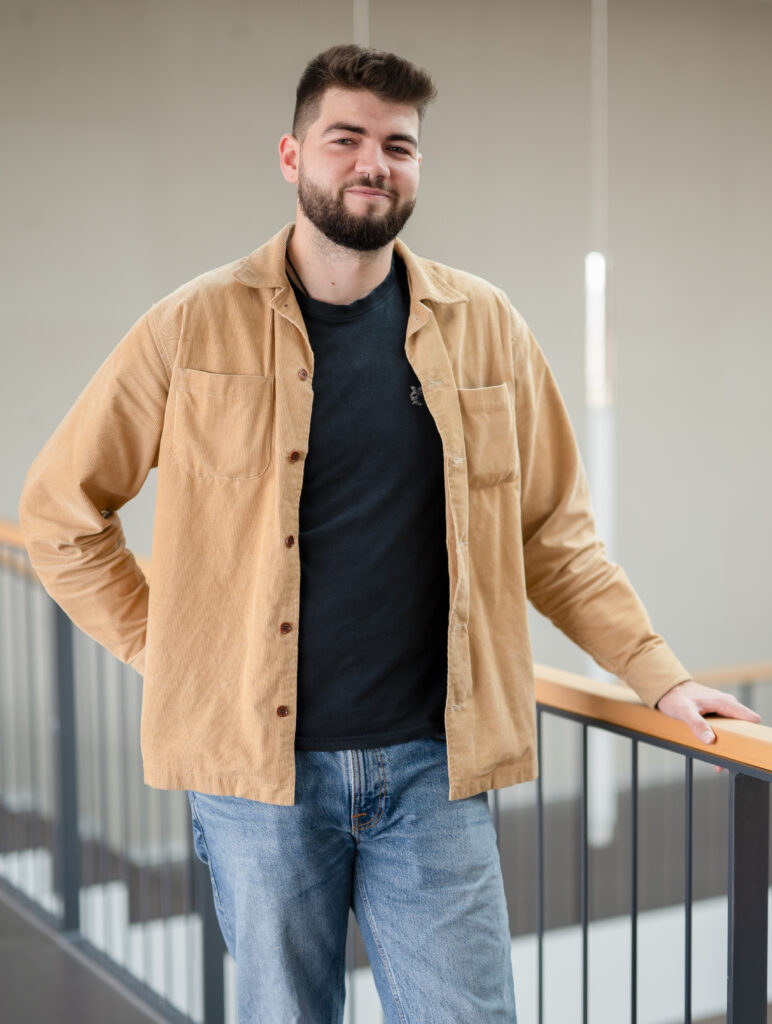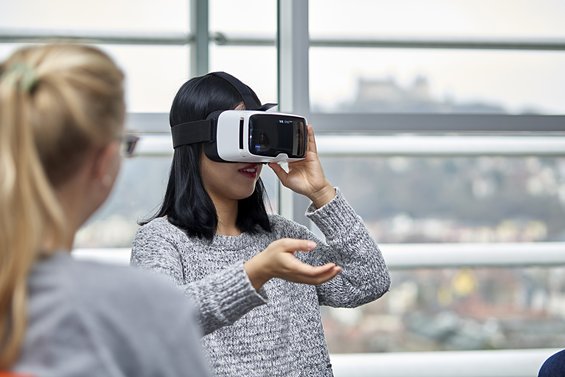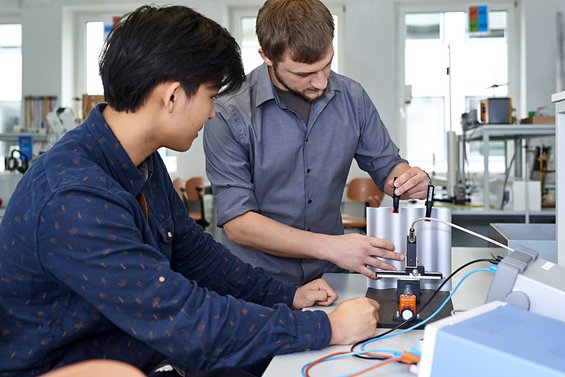Future Technologies / Emerging Technologies
At a glance
Academic degree
Bachelor of Engineering (B.Eng.)
Form of study
Full-time
Standard period of study
7 semesters (incl. practical semester), 210 ECTS
Place of study
Language of instruction
German
Start of studies
Winter and summer semester (October 01 and March 15 respectively)
Admission requirements
University entrance qualification, entrance qualification for universities of applied sciences, vocational qualification or foreign educational certificate
Orientation semester
Individual modules can be taken as part of an orientation semester
Studying with a practice partner
Semester abroad
Possible as a theoretical or practical semester
Accreditation
is started after the start of studies
Registration
02.05. – 30.09. (winter semester)
15.11 – 14.03 (summer semester)
Profile of the degree program
The course is aimed at individualists with a wide range of technical interests who like to decide for themselves which specialist areas they want to learn about. This modern engineering degree course offers the opportunity to study across faculty boundaries, giving you a very broad base and an international focus, allowing you to gain international experience at an early stage. The course is designed to work on technical and scientific solutions to the world’s problems.
What we value
Individual: free choice of subjects
In addition to the traditional subjects of mathematics, computer science, chemistry and physics, students can put together their own individual timetable from the third semester onwards. They can choose from subjects such as microfluidics and biosensor technology, photonics and laser technology and electrochemical energy storage, as well as other subjects from mechanical engineering, automotive technology or electrical engineering. In order to find out what suits them best, students are supported by personal consultations in an orientation colloquium.
Interdisciplinary: applying knowledge in combination
Innovative workshops that combine skills from physics, mathematics and computer science are integrated into the degree program. The aim of these “Physics-Mathematics-Informatics Workshops (PMI Workshops)” is to bundle knowledge from the three areas in such a way that specific problems can be solved efficiently and innovatively.
Study internationally: Emerging Technologies
If you would like to gain experience abroad during your studies, you can opt for the international Emerging Technologies major right at the start of your studies. They then have the opportunity in the 3rd and 4th semester to study at one of our partner universities. The different subject profiles of the respective universities abroad provide additional specialist impetus. In the following semesters at Coburg University of applied sciences and arts, the lectures in this branch of study are also predominantly in English.
Studying with in-depth practice
A degree course with in-depth practical experience (PraxisPLUS) offers the opportunity to gain up to 50 percent more practical experience during the course of your studies – without extending the duration of your studies. The prerequisite is a work contract with a company/institution. Students can apply their knowledge from the lecture directly at work. The work in the company is remunerated. This in turn makes it easier to finance their studies.
Our partner universities
USST Shanghai
Our partner university in China is the University of Shanghai for Science and Technology (USST). Around 22,000 students in 15 faculties study at this technical university. USST maintains a wide range of partnerships with universities worldwide. The course we are cooperating with is part of the Faculty of Optoelectronics, which has its seminar rooms and laboratories on the large main campus. The halls of residence are also located here, and there are many green spaces and sports facilities.
University of Twente
The University of Twente is a modern campus university in the Netherlands. On the international “Advanced Technology” course, students learn to apply their knowledge in projects. Teaching takes place in a personal atmosphere.
University of Winnipeg
The University of Winnipeg is located in the English-speaking part of Canada, in Manitoba to be precise. Students study physics there during their semester abroad. It specializes in particle physics and works closely with the TRIUMF research institute in Vancouver.
Further partnerships
Coburg University of applied sciences and arts is constantly expanding its partnerships. It is therefore possible to complete part of your studies at universities in other countries.
Course content and schedule
The “Emerging Technologies” course at Coburg University of Applied Sciences offers a broad and interdisciplinary education.
For example, it covers content and topics from the fields of mathematics and physics, computer science, electrical engineering and electronics, as well as computer-aided measurement technology, design and CAD. Interdisciplinary projects during the course help students to apply their knowledge.
Study content future technologies
1st and2nd semester
- Mathematics 1 + 2: Differential calculus and linear algebra; integrals and ordinary differential equations
- Computer science: Applied computer science and computer-aided measurement technology
- Physics 1 + 2: electricity and ray optics; mechanics, vibrations and waves
- Physics-Mathematics-Informatics Workshop (PMI-Workshop) 1 + 2
- Chemistry
- Orientation colloquium
3rd to 7th semester
- Individually selectable technology subjects from the fields of microfluidics and biosensor technology, photonics and laser technology, mechanical engineering, automotive technology and electrical engineering
- Math 3 + 4: Multidimensional and vector analysis; Partial differential equations and integral transformations
- Physics-Mathematics-Informatics Workshop (PMI-Workshop) 3 + 4
- Physics 3 + 4: Thermodynamics and fluid mechanics; electrodynamics and wave optics
- Computer-aided measurement technology
- Physics 5 + 6 (Quantum Mechanics and Atomic Physics; Solid State Physics)
- Student project
- Bachelor thesis and bachelor seminar
Practical semester of 18 weeks (5th semester): incl. practical courses
Study content Emerging Technologies
1st and2nd semester at Coburg University of Applied Sciences (teaching language German):
- Mathematics 1 + 2: Differential calculus and linear algebra; integrals and ordinary differential equations
- Computer science: Applied computer science and computer-aided measurement technology
- Physics 1 + 2: electricity and ray optics; mechanics, vibrations and waves
- Physics-Mathematics-Informatics Workshop (PMI-Workshop) 1 + 2
- Chemistry
- Orientation colloquium
3rd and4th semester at one of the partner universities abroad (teaching language English):
The subjects are based on the courses offered by the respective partner university
5th semester at Coburg University of Applied Sciences (teaching language mainly English):
- Partial and differential analysis and Integral Transformation
- Advanced Solid State
- Quantum Mechanics, Atomic Physics
- Materials Science
- Computer based Measurement Technologies
- Practice relevant modules
- Language
6th and7th semester
6th semester
- Internship semester in Germany or abroad
7th semester
- Elective project
- Bachelor Thesis and Bachelor Seminar
Job & Career
Physics engineers can be found wherever physical phenomena need to be translated into innovative technologies. The engineering training opens doors for graduates in various branches of industry, for example in energy and environmental technology, medical technology or the chemical and automotive industries. The well-founded theoretical training combined with practical application enables a wide range of activities in project management, quality assurance or research and development. Thanks to their individual specialization, our graduates have outstanding expertise in a specialist field after completing their studies.
As they have already learned to work in international teams during their studies, they have a wide range of entry opportunities in globally active companies in Germany and abroad. Thanks to their intercultural and language skills, they are ideally equipped to work in global companies.
Do another master's degree!
After successfully completing their Bachelor’s degree, committed graduates have the opportunity to gain further qualifications in a Master’s degree program. Coburg University of applied sciences and arts offers Master’s degree courses in Autonomous Driving, Additive Manufacturing & Lightweight Design and Development and Management in Mechanical and Automotive Engineering as well as other technical courses. You can also find an overview of which Master’s degree programs you can combine with your Bachelor’s degree here.
Insights
You are currently viewing a placeholder content from YouTube. To access the actual content, click the button below. Please note that doing so will share data with third-party providers.
More InformationYou are currently viewing a placeholder content from YouTube. To access the actual content, click the button below. Please note that doing so will share data with third-party providers.
More InformationEnrollment and admission
Admission requirements
Prospective students with a general higher education entrance qualification, subject-restricted higher education entrance qualification or entrance qualification for universities of applied sciences as well as – under certain conditions – prospective students without an Abitur can apply . The degree program is not admission-restricted, i.e. there is no numerus clausus (NC).
The Emerging Technologies major is taught in German and English. A prerequisite for admission to the Emerging Technologies major is proof of English language proficiency of at least B1 level, which must be provided by six weeks after the start of the second semester. International applicants can find out more here.
Curriculum and examination regulations
The module plans provide an overview of the structure of the degree program.
- module plan ZT winter semester
- module plan ZT summer semester
- module plan ZT/ET winter semester
- Module plan ZT/ET summer semester
The study and examination regulations forms the legal basis of the degree program. Questions about the content of the degree course will be answered by the course advisor Prof. Dr. Wolfram Haupt.
Study Ambassador

I am Christian Adler and a student ambassador for the Emerging Technologies degree program. As I study at Coburg University of applied sciences ands arts, I can answer your questions directly. So if you want to know what the degree program is all about or what it’s like to live in Coburg, just send me an e-mail: christian.adler@stud.hs-coburg.de.




